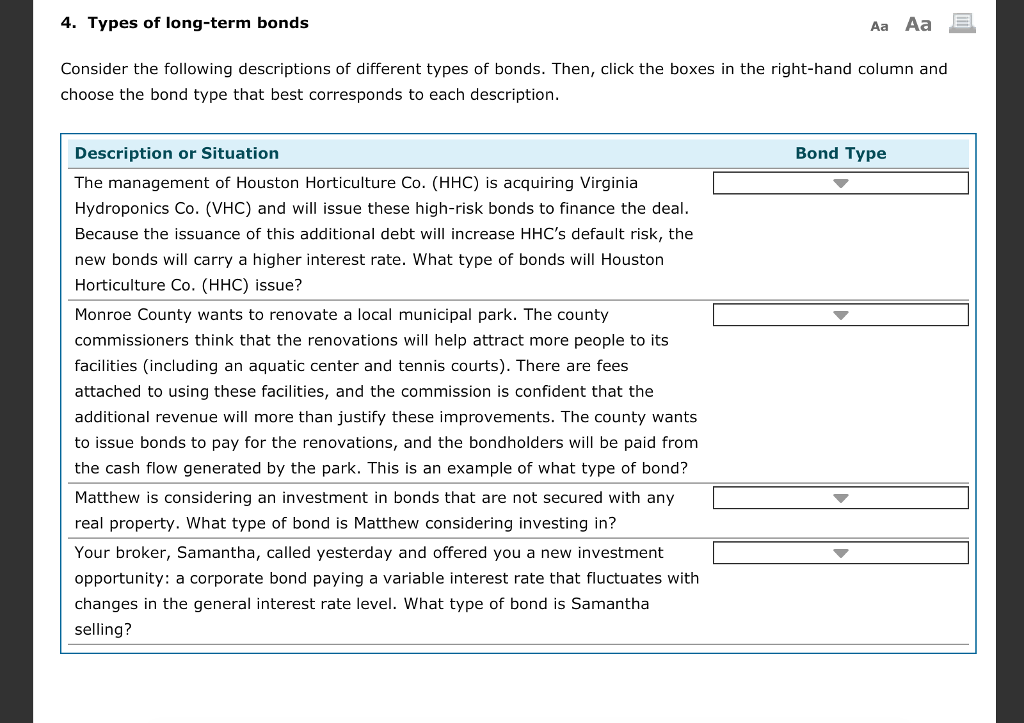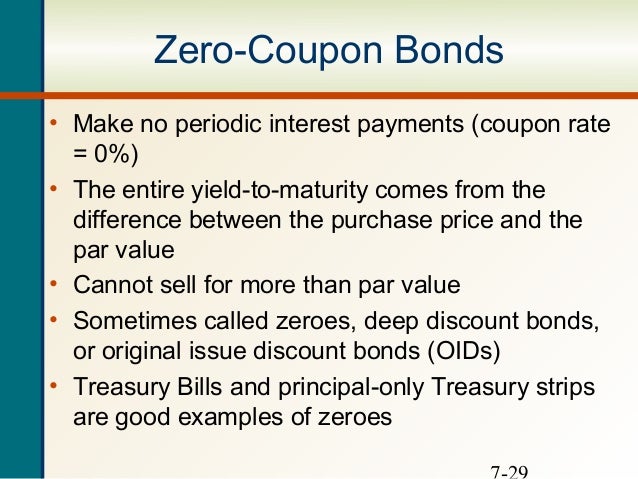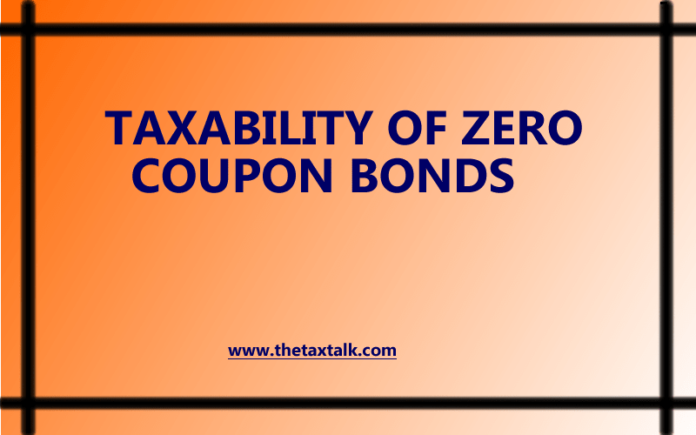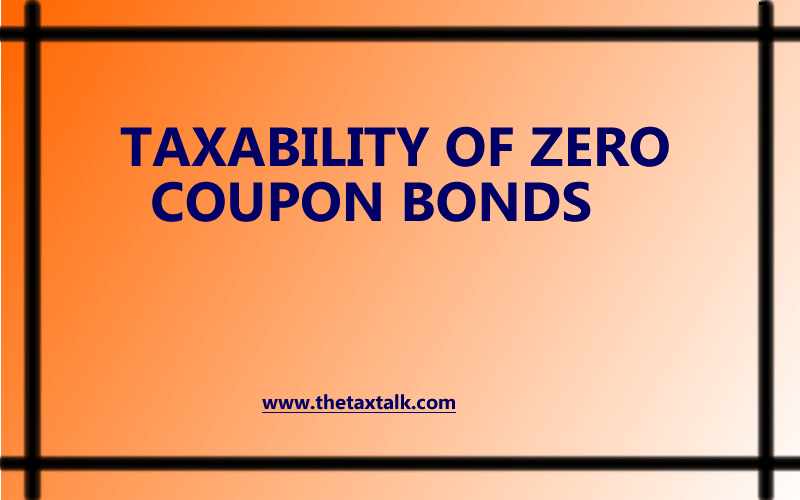43 zero coupon bonds tax
How are Bonds Taxed Under the Income Tax Act? - Wint Wealth 1. Zero-Coupon Bonds . Zero-coupon bondholders are liable to only capital gain tax as they do not provide any interest income. However, these are issued at a discount. Hence, the difference is taxed as capital gain. 2. Market-Linked Bonds . Market-linked bonds offer fixed interest, and the interest rates are linked to the index it is tracking ... How to Invest in Zero-Coupon Bonds | Bonds | US News The problem can be avoided with a tax-free municipal zero-coupon bond, or by holding the zero in a tax-preferred account like an individual retirement account. Volatility is a second issue ...
Impact of Taxation on Zero-Coupon Muni Returns Taxation on zero-coupon munis is only realized upon their sale or maturity. If the bond is sold before its maturity, it is either sold at a discount or a premium in the secondary market. Any price paid above the adjusted issue price (discussed below) will be premium and any price below the adjusted issue price will be discount.

Zero coupon bonds tax
The ABCs of Zero Coupon Bonds Zero coupon bonds are subject to an unusual taxation in which the receipt of interest is imputed each year, requiring holders to pay income taxes on what is ... All About Zero Coupon Bonds - Yahoo Similarly, tax-free zero-coupon bonds make good gifts for children who generate more than $1,800 in annual income and are subject to taxation on earnings. The bonds will provide income for the ... Zero-Coupon Bond - Definition, How It Works, Formula John is looking to purchase a zero-coupon bond with a face value of $1,000 and 5 years to maturity. The interest rate on the bond is 5% compounded annually. What price will John pay for the bond today? Price of bond = $1,000 / (1+0.05) 5 = $783.53 The price that John will pay for the bond today is $783.53. Example 2: Semi-annual Compounding
Zero coupon bonds tax. Section 2(48) Income Tax: Zero Coupon Bonds - Meaning ... Tax liability of investor on transfer of zero coupon bonds may be either short term or long depending upon the holding period, i.e. for not more than 12 months or otherwise. Proviso to Section 112(1) of Income Tax clarifies the process of calculating tax on long term capital gains arising from transfer of zero coupon bonds. Zero Coupon Bonds- Taxability Under Income Tax Act, 1961 According to this proviso, tax on long term capital gain on zero coupon bonds shall be lower of the following: - (a) Tax on capital gains computed normally @ 20% on difference of maturity price and purchase price (indexed) or Zero Coupon Bonds (ZCB) & its taxation in the hands of ... Sale, Maturity, Redemption or otherwise transfer of zero coupon bonds is considered as "Transfer" in the hands of investor for levy of capital gains tax under S.2 (47) (iva). Income arising from zero coupon bonds shall be taxed only in the year in which same is transferred or redeemed or matured. Zero Coupon Bond | Investor.gov Because zero coupon bonds pay no interest until maturity, their prices fluctuate more than other types of bonds in the secondary market. In addition, although no payments are made on zero coupon bonds until they mature, investors may still have to pay federal, state, and local income tax on the imputed or "phantom" interest that accrues each year.
Zero-coupon bond - Wikipedia Therefore, zero coupon bonds subject to US taxation should generally be held in tax-deferred retirement accounts, to avoid taxes being paid on future income. Alternatively, when a zero coupon bond issued by a US state or local government entity is purchased, the imputed interest is free of U.S. federal taxes and, in most cases, state and local ... The ABCs of Zero Coupon Bonds | Tax & Wealth Management, LLP Zero coupon bonds are subject to an unusual taxation in which the receipt of interest is imputed each year, requiring holders to pay income taxes on what is called "phantom income." Target Dates For individuals, zero coupon bonds may serve several investment purposes. How to Buy Zero Coupon Bonds | Finance - Zacks The bonds are issued at a minimum face value of $1,000, and the earliest a Treasury zero bond matures is in 10 years. The bond interest income is taxed at the federal level and possibly at the... PDF Income Taxes on Zero Coupon Bonds (Preliminary Version) the tax free rate to the after tax rate of return is a common comparison in evaluating taxable and tax free investments. A zero coupon bond pays only at maturity and doesn't pay periodic interest. For a taxable zero coupon bond, the IRS requires that income taxes be paid annually as OID securities
TAXABILITY OF ZERO COUPON BONDS - The Tax Talk Zero coupon bonds are taxable under two heads depending upon how the bond is held. If the bonds are held as capital asset, these are taxable under the head "Income from Capital Gains". These can be short term or long term depending upon the holding period. i.e. 12 months. Long term Capital gains will be taxable at the rate of 10%+ cess. No Advantages and Risks of Zero Coupon Treasury Bonds If issued by a government entity, the interest generated by a zero-coupon bond is often exempt from federal income tax, and usually from state and local income taxes too. Various local... Taxation of Zero coupon bonds | P2P Independent Forum Post by phil onMar 7, 2017 at 7:08am. Zero coupon bonds or any debt issued at a deep discount (those issued at 0.5%pa+ discount to maturity value) are generally taxed as income at maturity. There are a few exceptions to this treatment eg for life insurance policies, but none would seem to apply in this case. What is the tax implication on zero coupon bonds ... What is the tax implication on zero coupon bonds? Any long term capital gain on sale of zero coupon bonds shall be charged to tax at minimum of the following: 20% of LTCG After indexation of cost of such bonds or 10% of LTCG before indexation of cost of such bonds. Zero coupon bonds, Investing in Zero Coupon Bonds, Tax Considerations for Zero ...

4 things to know about Series I savings bonds | Savings bonds, Money stories, Zero coupon bond
Tax Utilities > Specified Zero Coupon Bonds - Income Tax ... Income Tax Department · Notification Number · Notification Date · Name of Bond · Tenure of Bond (Year) · Maturity Value · Year of Notification.
Solved: Zero coupon municipal bonds maturation Using the earlier example, if you paid $500 for a 10-year, $1,000 bond getting an interest rate of 7.05%, you would accrue $35.25 of interest in the first year. $500 x 0.0705 = $35.25 Your adjusted issue price, or cost basis, in the bond, would then become $535.25. $500 + $35.25 = $535.25 The following year, you would accrue $37.74 of interest.
Tax Considerations for Zero Coupon Bonds - Financial Web Tax Considerations Zero coupon bonds have unique tax implications. Technically, you are earning interest every year, even though you do not see it until the end of the bond term. Therefore, you have to pay the taxes on the interest every single year even though you do not get the interest until the end of the arrangement.
The One-Minute Guide to Zero Coupon Bonds | FINRA.org Instead of getting interest payments, with a zero you buy the bond at a discount from the face value of the bond, and are paid the face amount when the bond matures. For example, you might pay $3,500 to purchase a 20-year zero-coupon bond with a face value of $10,000. After 20 years, the issuer of the bond pays you $10,000.
Zero-Coupon Bond Definition - Investopedia The imputed interest on the bond is subject to income tax, according to the Internal Revenue Service (IRS). Therefore, although no coupon payments are made on zero-coupon bonds until maturity,...
How is tax calculated on a zero coupon bond? - Quora The brokerage firm calculates it annually—and reports it on your annual tax statement—by multiplying the cost of the bond ($900) by the Yield to Maturity (5.4%). So, on a 2-year, zero-coupon bond you bought for $900, the imputed interest for this year would be $50. You will pay tax on the $50, whether you actually made $50 or not.
Zero-Coupon Bonds - Tax Professionals Member Article By ... A zero-coupon bond is a type of fixed income instrument that pays no interest on the principal until maturity. Municipalities and businesses often issue Zero-coupon bonds to make saving for retirement, education, or other purposes more affordable.
Are Bonds Taxable? 2022 Rates, Types of Bonds, Tax ... With a zero-coupon bond , you buy the bond at a discount from its face value, don't receive interest payments during the bond's term, and are paid the bond's face amount when it matures. For...
Zero Coupon Municipal Bonds: Tax Treatment - TheStreet , the tax rules for zero-coupon bonds bought as new issues and held to maturity are fairly simple. Whether the bond is taxable or tax exempt, you have to accrue interest on the bond. That means you...
Bond (finance) - Wikipedia Zero-coupon bonds (zeros) pay no regular interest. They are issued at a substantial discount to par value, so that the interest is effectively rolled up to maturity (and usually taxed as such). The bondholder receives the full principal amount on the redemption date. An example of zero coupon bonds is Series E savings bonds issued by the U.S ...
Publication 1212 (01/2022), Guide to ... - IRS tax forms Zero coupon bonds. Form 1099-OID. Form 1099-OID not received. Reduction for acquisition premium. Transfers during the month. Debt Instruments Issued After July 1, 1982, and Before 1985 Debt Instruments Issued After 1984 Contingent Payment Debt Instruments Inflation-Indexed Debt Instruments Figuring OID on Stripped Bonds and Coupons
Taxes and zero coupon bonds - FMSbonds.com Tax-exempt interest earned on zero coupon bonds should be reported on your 1040, along with all other tax-exempt interest received. The interest reported is based on the original issue price and yield or, as you stated, "the bond's original accretion." Your adjusted basis in the bonds at any time after purchase would be your actual purchase ...

Not All Bonds Are Created Equal: Choosing Between Individual Bonds and Bond Funds - Hennion & Walsh
Understanding Zero Coupon Bonds - Part One You buy zero coupon bonds a deep discount to face value. You receive no interest until maturity; however, in most cases, you do owe taxes annually on the interest as it accrues. In Part Two In part two, we'll look more closely at the tax implications of zero coupon bonds and examine how you can use zeros to meet your financial goals.
14.3 Accounting for Zero-Coupon Bonds - Financial Accounting Figure 14.9 December 31, Year One—Interest on Zero-Coupon Bond at 6 Percent Rate 3. The compounding of this interest raises the principal by $1,068 from $17,800 to $18,868. The balances to be reported in the financial statements at the end of Year One are as follows: Year One—Interest Expense (Income Statement) $1,068.
Zero-Coupon Bond - Definition, How It Works, Formula John is looking to purchase a zero-coupon bond with a face value of $1,000 and 5 years to maturity. The interest rate on the bond is 5% compounded annually. What price will John pay for the bond today? Price of bond = $1,000 / (1+0.05) 5 = $783.53 The price that John will pay for the bond today is $783.53. Example 2: Semi-annual Compounding












Post a Comment for "43 zero coupon bonds tax"